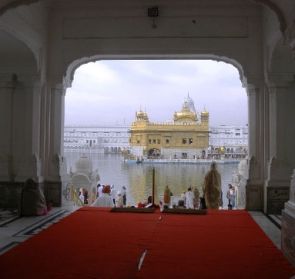 | « Back to article | Print this article |
 Recently declassified documents reveal that the Indian government wanted to invade the sacred precincts of the Golden Temple even if it hurt national interest, says senior Bharatiya Janata Party leader Arun Jaitley.
Recently declassified documents reveal that the Indian government wanted to invade the sacred precincts of the Golden Temple even if it hurt national interest, says senior Bharatiya Janata Party leader Arun Jaitley.
The Indian Army-led Operation Bluestar -- carried out in June 1984 -- will remain one of the most controversial acts of the government of independent India.
In order to marginalise the moderate Akalis in Punjab, a build-up of extremists was ignored. Instead of preventing hardliners from collecting in large numbers with arms and ammunitions inside the Golden Temple, the Government of India decided to look the other way.
It had hoped that moderate Sikh politicians would become irrelevant. It probably had planned that on the eve of the 1984 polls, a confrontation between the extremists and police and military would take place and the elections would be won by the Congress on patriotic slogans about saving Punjab and saving India from terror.
Those in the Government of India have recorded these incidents differently. I was amongst those present at the release of (the late civil servant) Dr P C Alexander's memoir a few years ago.
He was the principal secretary to the prime minister (Indira Gandhi) in May-June 1984 and perhaps one of the best witnesses to what was going on.
A chapter in his book on Operation Blue Star gives the impression that after the dialogue between Dr Alexander and (then Akali Dal leader) Sant Longowal failed, (Indian Army chief) General Arun Vaidya was called towards the end of May 1984 and asked to get ready for a military operation.
Did the Government of India gather the necessary intelligence and political inputs about the impact the military action would have on the Sikhs, one of the most patriotic communities?
Indeed, that was not a consideration for the Government of India.
The alienation of the Sikh community was not the only fallout of Operation Bluestar. It also led to the eventual assassination of Indira Gandhi and the massacre of Sikhs across the country.
While we in India still continue to debate on the judgement we wish to make on the controversial Operation Bluestar, a new set of declassified documents in Britain throw a different light on the subject.
In the United Kingdom, secret documents are declassified after a period of 30 years.
Documents pertaining to February 1984 have now been published. These are top-secret classified documents.
The principal secretary at (the British prime minister's residence) 10, Downing Street writes to Brian Fall of the Foreign and Commonwealth office -- on February 6, 1984 -- on the plan for the removal of dissident Sikhs from the Golden Temple.
He records that 'The prime minister (Margaret Thatcher) is content that the foreign secretary should proceed as he proposes. She will look forward to receiving a report on the advisor's visit and notes that the home secretary would be informed if the Indians seemed likely to proceed with the plan.'
Was Operation Bluestar planned on the advice of the British?
Contrary to what we have been told -- that it was the collapse of the dialogue between the government and the Akalis in May, 1984 that led to Operation Bluestar -- the Government of India was in dialogue with the British government over the plan to remove dissident Sikhs from the Golden Temple months earlier.
This letter is followed by Brian Fall's letter to the home secretary's office on February 23, 1984. This letter mentions the repercussions the operation will have on the Sikh community in England.
It categorically states that 'The Indian authorities recently sought British advice over a plan to remove Sikh extremists from the Golden Temple in Amritsar. The foreign secretary decided to respond favourably to the Indian request and with the prime minister's agreement, an SAS officer has visited India and drawn up a plan which has been approved by Indira Gandhi. The foreign secretary believes that the Indian government may put the plan into operation shortly.'
Making this classified document public after a period of thirty years -- as part of the declassification of confidential documents -- shows a significant foreign hand behind the advice given to Indira Gandhi to proceed in a particular manner.
The Indian Army was informed about the operation only towards the end of May 1984. The political consultation within the government on the subject was minimal.
Was any other country also consulted on this subject?
If the British government was being consulted in February 1984, it only lends credence to the fact that the Government of India neither believed in nipping the problem at the initial stage nor in exploring alternative methods of evacuating the extremists from the Golden Temple.
It wanted to invade the sacred precincts of the Golden Temple even if it hurt national interest and the interests of the Sikhs in the process.
In the next few months, more classified documents of the British government between February and June 1984 will become public due to the expiry of the limitation of 30 years.
It is about time the Government of India decided to tell the truth about the real facts. This will enable the people of India to conclude whether Operation Bluestar was a strategic miscalculation.